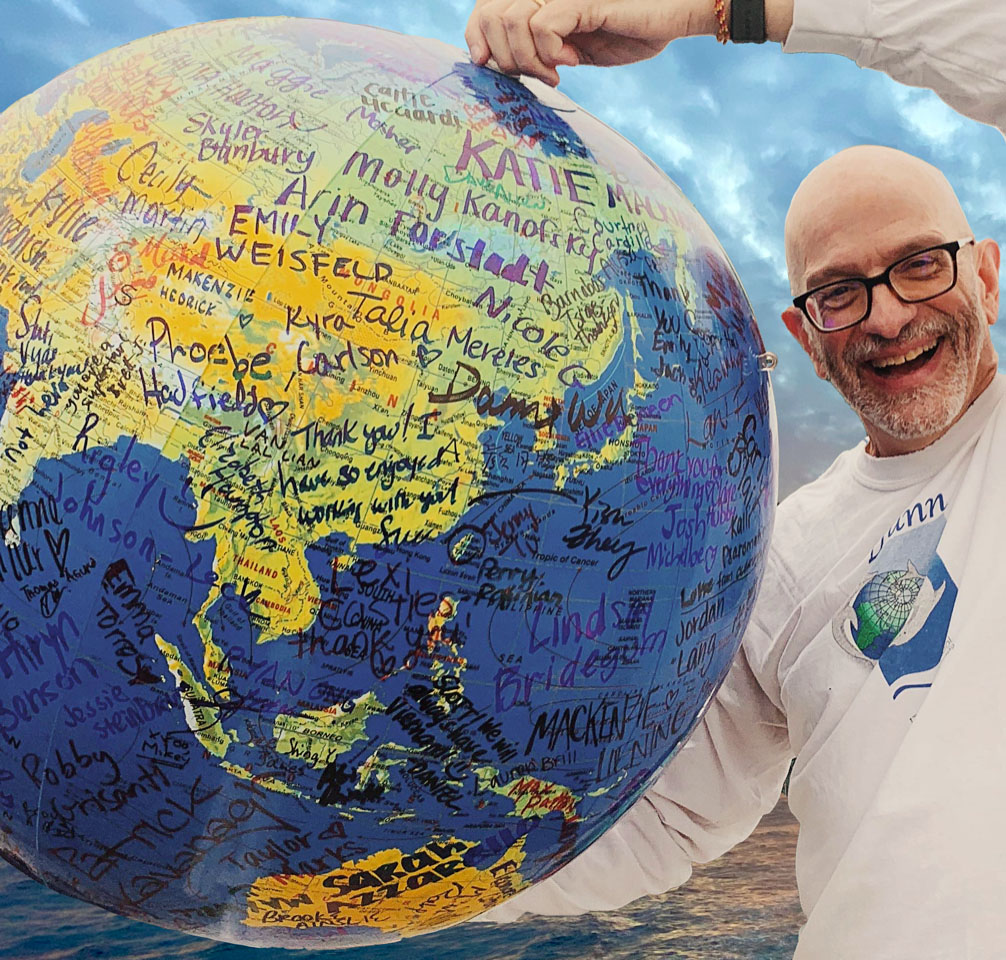
Professor Scott Denning, a climate scientist at Colorado State University, has been awarded the Climate Communication Prize by the American Geophysical Union, a professional organization of Earth and space scientists. The prize recognizes significant impact communicating climate science to the public.
Denning has presented hundreds of animated climate science talks over the past 15 years to audiences of all ages, all around the world. His outreach has included engaging 500,000 K-12 students in climate science and advising teachers, meteorologists and journalists in climate communication.
Denning relishes invitations to speak to climate change skeptics and says he “takes special delight in engaging hostile audiences.” His passion for science and relatable style have won over even a few hardcore climate change deniers.
“It is difficult to imagine anyone working harder or smarter to reach his audiences on the most important subject of our time,” said Susan Joy Hassol, director of Climate Communication, a science and outreach nonprofit.
Engineering SOURCE asked Denning a few questions about communicating this critical and sometimes ideologically charged subject.
You’ve talked to so many different audiences. Are there any that stand out?
There’s a tendency to wind up preaching to the choir. You get invited to events where everybody is already on board with climate action, and you feel like it’s not really accomplishing much because these people are already enthusiastic. Sometimes the choir tends to be sad, scared and despairing about the possibility of solving this problem, so it’s really meaningful when I can reach people and give them a realistic sense that we can solve this in time.
The other ones that I like a lot are high school classes. They tend to be super interested in this problem because they’re growing into being responsible for dealing with it, and they tend to be scared. There’s a lot of existential dread about climate change among the youth, and I feel like if I can reach these kids and explain to them that yes, this is a serious problem, but no, it’s not the end of the world unless we let it be the end of the world, and you have the power to save yourselves – wow, it’s just so meaningful to be able to reach teenagers like that.
How difficult is it to reach climate change deniers, and has that changed in recent years?
It’s both worse and better now. I started doing these public presentations 15 years ago, and the denier greatest hits were already out by then. Now I think it’s a much smaller group that repeats those things, but they are harder to reach. They are more isolated into their bubble. Public opinion polling shows that it’s in the single digits of the U.S. population that’s in this unreachable bubble on climate change.
You are passionate about climate communication. Why is this important to you?
Because it’s important to everybody, not just me. The climate problem is unique among world problems because it will get worse and worse until we stop making it worse, and then it won’t get better. It’s like we have our hand on a thermostat, and we can turn it up but it won’t turn back down, so we have to stop turning it up. This is a problem that unless we fix it, it will become the biggest problem in the world, and that’s really saying something when you consider all the other terrible problems in the world.
And, of course, I love science. I love learning about how the world works and explaining stuff to people, so it brings out my passion as a teacher.
How do you stay hopeful?
I feel like we have no choice. Partly, it’s just rational, fact-based optimism, which is that we must solve this problem, and therefore, we will solve this problem. We will be able to do this effectively, affordably and inevitably, we just have to, so the worse the conditions get, the more obvious that will become to people. The trouble isn’t scientific, economic or even technological; it’s about public perception, and public perception is guaranteed to move in the right direction, just by physics.
The other part of it is generic, and it’s how do we stay hopeful as human beings in the face of all the things that make this a broken world? It’s really not ethically acceptable to let the dire nature of the problem dissuade us from rising to the challenge and working on this.
When I was young, there was a song by Crosby, Stills and Nash called “Carry On,” and the refrain was “Rejoice, rejoice, we have no choice but to carry on,” so that’s my refrain.
Denning developed CSU courses ATS 150 and ATS 543 on global climate change and teaches 550 undergraduates aboard a floating classroom during Semester at Sea. You can view his talks on the three S’s of climate change: Simple, Serious and Solvable on Vimeo and his appearance in “Can We Cool the Planet?” on PBS NOVA.